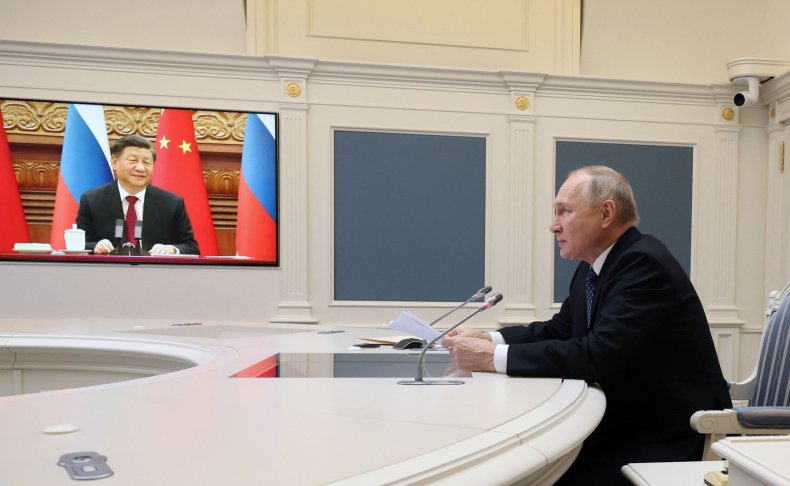Putin Says Russia-China Relationship 'Without Limitations'
President Vladimir Putin will seek to demonstrate the staying power of Russia's ties with China this week when he hosts his Chinese counterpart for talks accentuating Moscow's reliance on Beijing's political clout.
Xi Jinping, whose authority as president of China was renewed earlier this month, is embarking on the first state visit of his third term, and the destination of choice for his three-day trip, beginning Monday, is no accident. The Chinese leader is doubling down on his long-term bet of strategic alignment with Putin, whom he has met 40 times in various capacities since 2010—far more than with any other head of state.
They meet against the backdrop of Russia's ongoing war in Ukraine, the execution of which led the International Criminal Court to issue an arrest warrant for Russia's president over possible war crimes. In recent weeks, the West also has been watching closely for the emergence of Chinese weapons on the battlefield, although the threshold for potential sanctions remains unclear.
At the same time, Xi's travel comes with an air of expectation after China brokered a rapprochement between Iran and Saudi Arabia this month. Beijing's acceptance of a long-awaited call between Xi and President Volodymyr Zelensky of Ukraine—a necessary concession to give the appearance of neutrality—may add unwanted attention to the nebulous Chinese peace proposal, a plan seemingly designed to please no one.

Putin previewed the summit with his "good, old friend" Xi in an article in the People's Daily, the Communist Party's flagship newspaper, in which he declared the bilateral relationship had surpassed the height of Sino-Soviet ties during the Cold War. It was now a partnership "without limitations or taboos," he wrote.
"We have reached an unprecedented level of trust in our political dialogue, our strategic cooperation has become truly comprehensive in nature and is standing on the brink of a new era," said Putin, who spent considerable space railing against the "collective West," the U.S. and NATO, leaving little room to misinterpret the Kremlin's priorities when it comes to its friendship with Beijing.
Xi, meanwhile, framed his visit as "a journey of friendship, cooperation and peace." In op-eds in the state-owned Russian Gazette, China's president was cautious not to publicly repeating his highly scrutinized proclamation of a "no limits" partnership with Putin's Russia, instead reaffirming the longstanding Chinese principle of no alliances, no confrontation and no targeting third parties.
Unlike Putin, Xi made no direct reference to the West or the U.S. but said the world was faced with "damaging acts of hegemony, domination and bullying." Downplaying the shared strategic view, however, China's leader insisted there was "a clear historical logic and strong internal driving force for the growth of China-Russia relations."
It suggested that, despite the international pressure, Beijing would continue to grow its comprehensive partnership with Moscow in all areas: energy, finance, trade, security and political coordination.

China has juggled competing interests in the last year. In dialogue with the West, it has highlighted a shared desire for peace while dismissing gaps in its apparently watertight relations with Russia. Chinese officials have reportedly expressed frustration at the tendency of Russian counterparts to strategically leak Beijing's otherwise private assurances about the war as well as continued high-level political support.
But any discomfort likely is more superficial than permanent, and Xi's moderation of past forward-leaning language won't stop him from advancing deeper ties with Putin, subject-matter experts say.
"In a sense, this visit is a routine part of what Xi Jinping has been building with Russia for over a decade. And the fact that he's prepared to go ahead with this in the circumstances of the war is notable," Andrew Small, senior fellow with the Indo-Pacific Program at the German Marshall Fund of the United States, told Newsweek.
"This is part of a longer-term trajectory of deepening and expanding ties between China and Russia in the context of the overall strategic situation that Xi Jinping sees, which is about struggle with the United States," Small said. "In some respects, the Chinese side also wants to show that they're still reliable partners in times of adversity, despite some possible constraints on what China is willing to do with reference to the war."
"There is a degree of care on the Chinese side at the moment for how some of this is perceived. In another era of Chinese diplomacy, this would be seen as far too delicate to conduct in these circumstances," he said. "It would have been very easy for Xi to come up with reasons not to go to Russia right now, so what that gesture represents, regardless of the language, is extremely significant."
Theresa Fallon, the director of the Center for Russia Europe Asia Studies, said: "It's a complex diplomatic dance Xi Jinping has to do. He's supporting Putin while trying to rebrand himself as the world's leading peacemaker, riding on the momentum of the Iran-Saudi deal."
"It's interesting timing because today is the 20th anniversary of the [U.S.] invasion of Iraq. The alliance of autocracies is strengthening," Fallon told Newsweek. "But how much leverage does Xi have? Putin has been around for over 22 years. I don't think he listens to anybody."
The ICC's warrant for Putin's arrest "does make for bad optics," according to Fallon, who argued it was unlikely to bother Xi or Putin. Neither China nor Russia are signatories to the Rome Statute, under which the court was established.
"The transport of children from Ukraine to Russia to reeducation camps has an uncomfortable echo of taking children away from Uyghurs in Xinjiang, putting them in schools, separating them from their parents, training them only in Mandarin, and educating the next generation so that they will have a different view of Han Chinese," she said.
China's Foreign Ministry on Monday said the ICC should avoid "politicization and double standards." Spokesperson Wang Wenbin said the court should "respect the immunity of heads of state from jurisdiction under international law.
Do you have a tip on a world news story that Newsweek should be covering? Do you have a question about China? Let us know via worldnews@newsweek.com.

